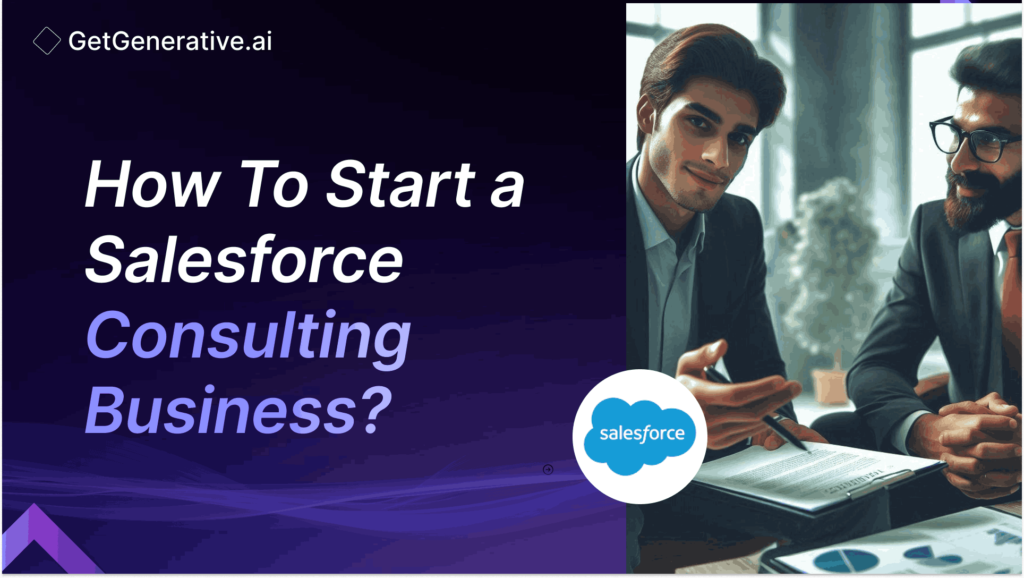How To Start a Salesforce Consulting Business?
Customer Relationship Management (CRM) systems have become indispensable tools for companies of all sizes. Among these, Salesforce stands out as a leader, commanding a 23.8% market share in the CRM space as of 2024. This dominance has created a thriving ecosystem of consultants and service providers, with the Salesforce consulting services market expected to reach $56.99 billion by 2032, growing at a CAGR of 15.3% from 2024 to 2032.
The increasing adoption of Salesforce across industries has led to a surge in demand for skilled professionals who can implement, customize, and optimize Salesforce solutions. This presents a golden opportunity for entrepreneurs and tech-savvy individuals to start their own Salesforce consulting businesses.
In this comprehensive guide, we’ll walk you through the key steps to launch and grow a successful Salesforce consulting venture, along with insights into the skills required, market positioning strategies, and common challenges you might face.
Key Steps
1. Understand the Salesforce Ecosystem
Before diving into the consulting business, it’s crucial to have a deep understanding of the Salesforce ecosystem. This includes:
- Salesforce products and clouds (Sales Cloud, Service Cloud, Marketing Cloud, etc.)
- Salesforce development tools and technologies (Apex, Visualforce, Lightning Web Components)
- AppExchange and third-party integrations
- Salesforce certifications and their importance
- Salesforce release cycles and staying updated with new features
Immerse yourself in Salesforce documentation, participate in community forums, and attend Salesforce events to understand the platform and its capabilities comprehensively.
2. Define Your Niche and Target Market
The Salesforce consulting market is vast, and trying to be everything to everyone can be overwhelming. Instead, focus on a specific niche or industry vertical. Consider factors such as:
- Your previous industry experience
- Specific Salesforce products or clouds you excel in
- Size of businesses you want to target (SMBs, mid-market, or enterprise)
- Geographic focus (local, national, or international)
For example, you might specialize in Salesforce Marketing Cloud implementations for mid-sized healthcare companies in the Midwest United States.
3. Create a Business Plan
A well-crafted business plan guides your venture and attracts potential investors or partners. Your plan should include:
- Executive summary
- Company description and structure
- Market analysis and target audience
- Services offered and pricing strategy
- Marketing and sales strategies
- Financial projections and funding requirements
- Operational plan and team structure
Be realistic in your projections and include contingency plans for various scenarios.
Also Read – Becoming a Salesforce Consultant – The Ultimate Guide
4. Build Your Network
Networking is crucial in the consulting world. Start building your professional network by:
- Attending Salesforce events (Dreamforce, World Tours, Community Groups)
- Joining online communities (Trailblazer Community, LinkedIn groups)
- Connecting with other Salesforce professionals and potential clients
- Participating in industry-specific events related to your chosen niche
Remember, your network can be a source of partnerships, referrals, and valuable insights.
5. Gain Experience
To establish credibility, you need hands-on experience with Salesforce implementations and customizations. If you’re new to consulting, consider:
- Working for an established Salesforce consulting firm to gain experience
- Taking on pro-bono projects for non-profits or small businesses
- Building a portfolio of personal projects and case studies
- Contributing to open-source Salesforce projects
Document your experiences and outcomes to showcase your expertise to potential clients.
6. Join Salesforce’s Partner Program
Becoming a Salesforce Partner can provide numerous benefits, including:
- Access to training resources and certifications
- Listing in the Salesforce AppExchange Partner Directory
- Co-marketing opportunities with Salesforce
- Eligibility for partner-specific events and support
Research the requirements and benefits of different partner tiers to determine the best fit for your business.
7. Market Your Services
Develop a comprehensive marketing strategy to attract clients:
- Create a professional website showcasing your services and expertise
- Develop thought leadership content (blog posts, whitepapers, case studies)
- Utilize social media platforms to share insights and engage with potential clients
- Consider paid advertising on platforms like LinkedIn or Google Ads
- Attend and speak at industry events to establish yourself as an expert
Focus on highlighting your unique value proposition and demonstrating your expertise in your chosen niche.
8. Focus on Client Relationships
Building strong client relationships is key to long-term success in consulting. Prioritize:
- Clear communication and expectation-setting
- Delivering high-quality work consistently
- Providing excellent post-implementation support
- Seeking and acting on client feedback
- Identifying opportunities for upselling and cross-selling services
Happy clients can become your best source of referrals and testimonials.
Also Read – Real-World Applications of Generative AI for Salesforce Consultants
What are the key skills needed to start a successful Salesforce consultancy?
To thrive in Salesforce consulting, you’ll need a combination of technical and soft skills:
Technical Skills:
- Proficiency in Salesforce configuration and customization
- Understanding of Salesforce development (Apex, Visualforce, Lightning Web Components)
- Knowledge of data migration and integration techniques
- Familiarity with Salesforce APIs and AppExchange
- Understanding of security and compliance best practices
Soft Skills:
- Strong communication and presentation abilities
- Project management and organization
- Problem-solving and critical thinking
- Adaptability and continuous learning
- Business acumen and industry knowledge
Consulting Skills:
- Requirements gathering and analysis
- Solution design and architecture
- Change management and user adoption strategies
- Training and documentation
Continuously updating your skills and obtaining relevant Salesforce certifications will help you stay competitive in the market.
How can I identify my unique selling proposition (USP) in the Salesforce consulting market?
To stand out in the crowded Salesforce consulting market, consider these strategies for developing your USP:
- Specialization: Focus on a specific industry vertical or Salesforce product
- Methodology: Develop a unique approach to implementations or problem-solving
- Technology: Offer expertise in cutting-edge Salesforce features or integrations
- Results: Highlight measurable outcomes and ROI from past projects
- Service Model: Provide innovative engagement models or pricing structures
Analyze your strengths, market gaps, and client needs to craft a compelling USP that resonates with your target audience.
What are the best pre-sales strategies for attracting clients to a new Salesforce consultancy?
Effective pre-sales strategies for a new Salesforce consultancy include:
- Offer free consultations or assessments to demonstrate value
- Create and share targeted content addressing common pain points
- Develop case studies and success stories from initial projects
- Leverage your network for referrals and introductions
- Participate in industry events and Salesforce user groups
- Collaborate with complementary service providers for cross-referrals
- Utilize LinkedIn for targeted outreach and relationship-building
- Offer workshops or webinars to showcase your expertise
Focus on building trust and demonstrating your expertise to potential clients.
Also Read – Salesforce Consultant Salaries
How important is industry expertise when starting a Salesforce consulting business?
Industry expertise can be a significant differentiator for a Salesforce consulting business:
- It allows you to speak the client’s language and understand their unique challenges
- You can offer industry-specific best practices and solutions
- It helps in building credibility and trust with potential clients
- Industry knowledge can lead to faster implementation times and better outcomes
- It enables you to develop specialized solutions or AppExchange products
While not necessary, industry expertise can give you a competitive edge, especially when targeting larger clients or complex projects.
What are the most common challenges faced by new Salesforce consulting businesses?
New Salesforce consulting businesses often encounter these challenges:
- Building a client base and establishing credibility
- Managing cash flow and securing initial funding
- Scaling operations while maintaining quality
- Keeping up with Salesforce’s rapid release cycle and new features
- Attracting and retaining skilled Salesforce professionals
- Differentiating from established consulting firms
- Balancing project work with business development activities
- Managing client expectations and scope creep
Anticipating these challenges and developing strategies to address them can help ensure the long-term success of your consulting business.
Conclusion
Starting a Salesforce consulting business can be rewarding for those with the right skills, expertise, and entrepreneurial spirit. You can build a successful consulting practice in the growing Salesforce ecosystem by following the key steps outlined in this guide, focusing on your unique value proposition, and continuously adapting to market needs.
Enhance your Salesforce consulting with GetGenerative.ai. Effortlessly craft outstanding proposals, enabling you to dedicate more time to providing exceptional client service.
Start today!
Frequently Asked Questions (FAQs)
1. How long does it take to start a Salesforce consulting business?
Setting up the business can take 3-6 months, but building a stable client base may take 1-2 years.
2. Do I need to be Salesforce certified?
While not mandatory, certifications greatly enhance credibility and are often required for partnership status.
3. Can I start as a solo consultant?
Many successful Salesforce consultancies start as solo operations before scaling up.
4. How do I price my services?
Consider factors like experience, project complexity, and market rates. Hourly rates typically range from $100 to $300+.




